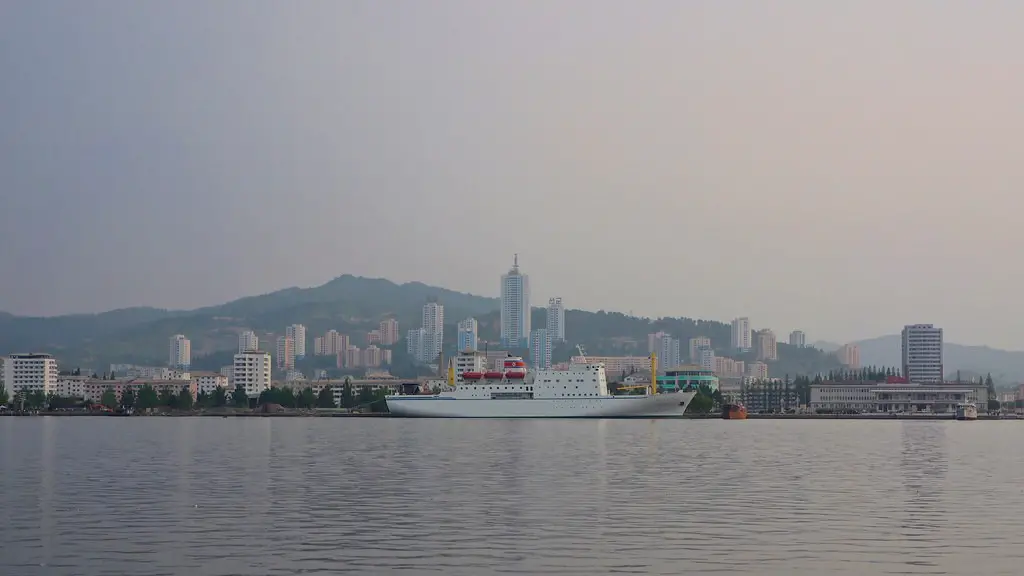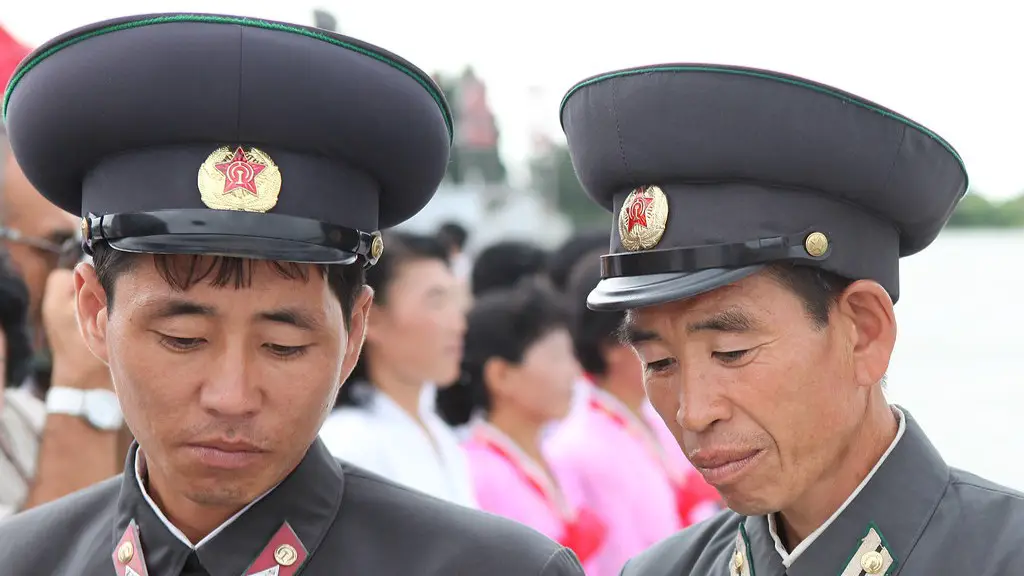Section 1 – General Notions
North Korea is widely considered one of the most repressive and oppressive countries in the world. The government has been widely condemned by the international community for its brutal treatment of citizens and lack of human rights. This is an area of international concern as it has been highlighted in many reports by the United Nations and other entities. The strategy and tactics used by the North Korean government to control its citizens and to prevent them from escaping its borders is a topic of intense debate and dispute. To understand how to escape North Korea, it is necessary to know the types of control and the escape methods used by citizens to exit the country.
The North Korean government utilizes a variety of measures to tightly control its citizens. This includes a strong surveillance system, restrictions on mobility and information, a system of punishment for violations, and other tactics. The surveillance system and restrictions are designed to limit the ability of citizens to move about freely and to access information, which can ultimately limit their ability to escape. Punishments for violations of regulations are severe, including labor camps and even executions. Furthermore, close family members of those attempting to escape are often punished as well.
The number of citizens that successfully escape from North Korea is limited. Estimates suggest that only around 500-1000 individuals escape each year. Those who are successful in their escape often enlist the help of outside agencies, such as NGOs, who facilitate their escape by providing shelter, information, and assistance.
Section 2 – Perils of Escape
Escape attempts are highly risky and often involve a great deal of danger and risk taking on the part of the escapee. This is particularly true for those attempting to flee overland through North Korea’s militarized borders or by crossing over to China. This is because North Korea is vigilant in policing its borders and anyone suspected of attempting to escape is subject to severe punishment. In addition, the terrain of North Korea can be difficult to traverse, especially for those who are unfamiliar with the country.
For those planning to escape by boat, the risks are likely even greater. This is due to the fact that refugees face a higher risk of arrest or being handed over to the North Korean authorities by neighbouring countries. Furthermore, those fleeing by boat face the additional dangers of the open waters and the weather. For those who are able to make it to their intended destination, they often face difficulties with lodging, personal safety, and finding work due to inadequate resources, access to information and language barriers.
Section 3 – How to Increase Chances of Escape
In order to increase the chances of a successful escape, it is helpful to understand the methods commonly used. One effective way is to enlist the help of international NGOs that specialize in helping North Korean refugees. These organizations can provide valuable information, contacts, and assistance in facilitating an escape. Securing financial resources is also important as those attempting to escape will need resources to provide for their safe passage and lodging. Additionally, those attempting to escape should thoroughly research their intended routes and create contingency plans for various situations.
Another important factor is timing. Ideally, those attempting to escape should do so when the North Korean authorities are preoccupied with other matters. This will minimize the attention that the escapee attracts and increase their chances of success. Furthermore, if an escapee can find a way to contact family members outside of North Korea, this can also be beneficial as support networks can help provide resources, contacts, and emotional support.
Section 4 – How To Prepare for an Escape
Preparing for an escape is a complex and difficult process, but it is essential for those attempting to flee. It is important to construct a plan and to identify a safe route to take during the escape. Those preparing to escape should also acquire a valid passport, as this will be needed in order to cross any national borders. In addition, they should familiarize themselves with the prospective route. This can help them identify any obstacles, such as border crossings and changes in terrain, that could pose problems during the escape.
An escapee should also take steps to disguise their identity in order to avoid detection. This can include changing their appearance, using an alias, and using cash instead of a credit card. Additionally, it is important to pack accordingly, as those attempting to flee will need to bring enough supplies to last the duration of their escape. This includes food, clothing, and medical supplies. It is also important to have a means of communication, such as a smartphone or a satellite phone, in order to contact those that can provide assistance during the escape.
Section 5 – Alternatives to Escaping
In some cases, attempting to escape may not be possible or may be too dangerous. For those in such situations, there are other ways that they can make their voices heard and draw attention to the violations of human rights that occur in North Korea. One such way is to use social media and other platforms to spread awareness. Those in North Korea have access to the internet, which can be used to share information and make contact with outside sources. This can be a powerful tool for those looking to shed light on the injustices occurring in North Korea.
Those in North Korea can also make use of a variety of organizations within the country, such as the Korean Human Rights Foundation (KHRF), which works to promote human rights in the country and to provide information, assistance, and support to those in need. Similarly, those living in North Korea can also make use of organizations located outside the country, such as Liberty in North Korea (LiNK), an organization that helps refugees and works to end human rights violations in North Korea.
Section 6 – Defectors’ Tales
A powerful way to understand the escape process is to hear the stories of those who have succeeded in their attempts. Defectors often share their story in order to bring attention to the plight of those still living in North Korea and to shed light on the dangers and travails they faced while escaping. These stories demonstrate the difficulty of the escape process and provide valuable insight into the strategies used to ensure success.
Moreover, hearing the stories of former North Koreans can also be helpful for those contemplating an escape. Tales of successful escapes can provide hope and a glimpse into the possibilities for a better life beyond North Korea’s borders. However, it is also important to acknowledge that these stories rarely paint a fully accurate picture of the escape process. As such, defectors’ stories should be heard with caution and taken with a grain of salt.
Section 7 – Policy Change for Escapees
Escapees and refugees face many difficulties in their new home countries due to the lack of resources to support them and the discrimination they often face. Efforts are being made by both NGOs and governments to address these issues and to provide escapees with the tools they need to start a new life.
In the United States, several initiatives have been implemented, such as the North Korean Human Rights Act of 2004, which provides funding for North Korean refugees, as well as the North Korean Refugee Admissions Program, which provides unrestricted permanent residency in the United States for those who successfully escape. Similarly, in South Korea, the Ministry of Unification has established various programs to provide financial support and resources to North Korean refugees, such as the Unification Support for Refugees program, which provides legal, health, and educational services.
Section 8 – Reintegration
After successfully escaping from North Korea, refugees must go through the process of reintegration in their new home countries. For many, this can be a difficult and challenging process as they may have to adapt to a new culture and lifestyle. In addition, they may face barriers to employment due to lack of education or language barriers. To address these issues, refugees should seek out organizations that are specifically dedicated to helping North Koreans, as they will be able to provide resources and assistance tailored to the specific needs of former North Koreans.
In addition, refugees should take advantage of any educational or language training opportunities available in their new country. This can help them learn the local language and culture, and can provide them with the skills and resources needed to seek out employment opportunities. Similarly, refugees should also reach out to their local communities and get involved. By doing so, they can develop social ties and build a strong support network amongst the community.
Section 9 – International Aid
With the increasing attention that North Korea’s human rights violations are receiving, there has been a growing emphasis on the need for international aid for those fleeing. The United Nations, for example, has established the North Korea Human Rights Fund for this purpose. This fund provides resources to international organizations that are helping and protecting North Korean refugees, as well as focuses resources on education and development projects in the region.
Additionally, other governments are beginning to provide assistance as well. The United States, for example, has increased its aid to North Korea by providing funding for programs that support refugees, such as the North Korean Humanitarian Assistance Initiative, and issuing grants for organizations that are helping refugees. Other organizations that are focusing on providing aid to North Korean refugees include Gideon’s Army, Grassroots Support for North Korea, and the Support to North Korean Human Rights and Humanitarian Assistance (NKHRHA) project.
Section 10 – The Impact of Sanctions
The recent introduction of international sanctions against the North Korean government has had a tremendous impact on escapees. Sanctions have hindered their ability to access basic goods, restricted their access to the internet, and further limited their opportunities for employment. In addition, sanctions hinder the efforts of NGOs, as they are unable to access funds and resources needed to adequately support refugees. As such, these measures have been heavily criticized by members of the international community, as they impede the process of escape and make it more difficult for former North Koreans to rebuild their lives in their new homes.


